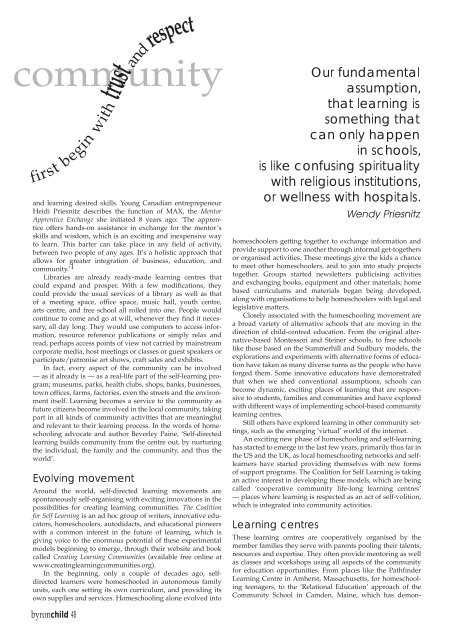byronchild - logo
byronchild - logo
byronchild - logo
Create successful ePaper yourself
Turn your PDF publications into a flip-book with our unique Google optimized e-Paper software.
community<br />
first begin with trust and respect<br />
and learning desired skills. Young Canadian entreprepeneur<br />
Heidi Priesnitz describes the function of MAX, the Mentor<br />
Apprentice Exchange she initiated 8 years ago: ‘The apprentice<br />
offers hands-on assistance in exchange for the mentor’s<br />
skills and wisdom, which is an exciting and inexpensive way<br />
to learn. This barter can take place in any field of activity,<br />
between two people of any ages. It’s a holistic approach that<br />
allows for greater integration of business, education, and<br />
community.’ 1<br />
Libraries are already ready-made learning centres that<br />
could expand and prosper. With a few modifications, they<br />
could provide the usual services of a library as well as that<br />
of a meeting space, office space, music hall, youth centre,<br />
arts centre, and free school all rolled into one. People would<br />
continue to come and go at will, whenever they find it necessary,<br />
all day long. They would use computers to access information,<br />
resource reference publications or simply relax and<br />
read, perhaps access points of view not carried by mainstream<br />
corporate media, host meetings or classes or guest speakers or<br />
participate/patronise art shows, craft sales and exhibits.<br />
In fact, every aspect of the community can be involved<br />
— as it already is — as a real-life part of the self-learning program;<br />
museums, parks, health clubs, shops, banks, businesses,<br />
town offices, farms, factories, even the streets and the environment<br />
itself. Learning becomes a service to the community as<br />
future citizens become involved in the local community, taking<br />
part in all kinds of community activities that are meaningful<br />
and relevant to their learning process. In the words of homeschooling<br />
advocate and author Beverley Paine, ‘Self-directed<br />
learning builds community from the centre out, by nurturing<br />
the individual, the family and the community, and thus the<br />
world’.<br />
Evolving movement<br />
Around the world, self-directed learning movements are<br />
spontaneously self-organising with exciting innovations in the<br />
possibilities for creating learning communities. The Coalition<br />
for Self Learning is an ad hoc group of writers, innovative educators,<br />
homeschoolers, autodidacts, and educational pioneers<br />
with a common interest in the future of learning, which is<br />
giving voice to the enormous potential of these experimental<br />
models beginning to emerge, through their website and book<br />
called Creating Learning Communities (available free online at<br />
www.creatinglearningcommunities.org).<br />
In the beginning, only a couple of decades ago, selfdirected<br />
learners were homeschooled in autonomous family<br />
units, each one setting its own curriculum, and providing its<br />
own supplies and services. Homeschooling alone evolved into<br />
<strong>byronchild</strong> 48<br />
Our fundamental<br />
assumption,<br />
that learning is<br />
something that<br />
can only happen<br />
in schools,<br />
is like confusing spirituality<br />
with religious institutions,<br />
or wellness with hospitals.<br />
homeschoolers getting together to exchange information and<br />
provide support to one another through informal get-togethers<br />
or organised activities. These meetings give the kids a chance<br />
to meet other homeschoolers, and to join into study projects<br />
together. Groups started newsletters publicising activities<br />
and exchanging books, equipment and other materials; home<br />
based curriculums and materials began being developed,<br />
along with organisations to help homeschoolers with legal and<br />
legislative matters.<br />
Closely associated with the homeschooling movement are<br />
a broad variety of alternative schools that are moving in the<br />
direction of child-centred education. From the original alternative-based<br />
Montessori and Steiner schools, to free schools<br />
like those based on the Summerhill and Sudbury models, the<br />
explorations and experiments with alternative forms of education<br />
have taken as many diverse turns as the people who have<br />
forged them. Some innovative educators have demonstrated<br />
that when we shed conventional assumptions, schools can<br />
become dynamic, exciting places of learning that are responsive<br />
to students, families and communities and have explored<br />
with different ways of implementing school-based community<br />
learning centres.<br />
Still others have explored learning in other community settings,<br />
such as the emerging ‘virtual’ world of the internet.<br />
An exciting new phase of homeschooling and self-learning<br />
has started to emerge in the last few years, primarily thus far in<br />
the US and the UK, as local homeschooling networks and selflearners<br />
have started providing themselves with new forms<br />
of support programs. The Coalition for Self Learning is taking<br />
an active interest in developing these models, which are being<br />
called ‘cooperative community life-long learning centres’<br />
— places where learning is respected as an act of self-volition,<br />
which is integrated into community activities.<br />
Learning centres<br />
Wendy Priesnitz<br />
These learning centres are cooperatively organised by the<br />
member families they serve with parents pooling their talents,<br />
resources and expertise. They often provide mentoring as well<br />
as classes and workshops using all aspects of the community<br />
for education opportunities. From places like the Pathfinder<br />
Learning Centre in Amherst, Massachusetts, for homeschooling<br />
teenagers, to the ‘Relational Education’ approach of the<br />
Community School in Camden, Maine, which has demon


